SpaceX Pulls Off Jaw-Dropping Ocean Rocket Landing
Cape Canaveral, FL — April 11, 2025
In a stunning display of technological precision and innovation, SpaceX has once again pushed the boundaries of space travel by successfully landing one of its Falcon 9 rockets in the ocean, continuing its mission of creating fully reusable spaceflight systems.
The rocket, launched from NASA’s Kennedy Space Center in Florida, carried a payload of communication satellites into low Earth orbit before executing a controlled descent back to Earth. Minutes after stage separation, the first stage of the Falcon 9 reignited its engines and began its descent, ultimately landing upright on the company’s autonomous drone ship stationed in the Atlantic Ocean.
The moment was captured on high-definition cameras aboard the ship and has since gone viral across social media platforms. Viewers from around the world were left amazed by the sheer precision of the landing, which appeared almost effortless despite the extreme complexity of the maneuver.
“This successful ocean landing demonstrates how far we’ve come in making space travel more efficient and sustainable,” said Elon Musk, CEO of SpaceX, in a post on X (formerly Twitter). “Every recovered booster brings us closer to truly affordable spaceflight.”
The recovered booster will undergo inspection and refurbishment before potentially being reused in future missions. This is part of SpaceX’s larger goal to drastically reduce the cost of space launches by developing fully reusable rocket systems.
This marks the 34th successful ocean landing for SpaceX, further solidifying its position as a leader in commercial spaceflight and rocket reusability.
As private companies and government agencies around the world continue to look toward the stars, SpaceX’s consistent innovation serves as a beacon of what’s possible when technology, vision, and engineering come together.
The next launch featuring a Falcon 9 is scheduled for later this month, with plans for more advanced recovery tests, including landings in harsher weather conditions.




